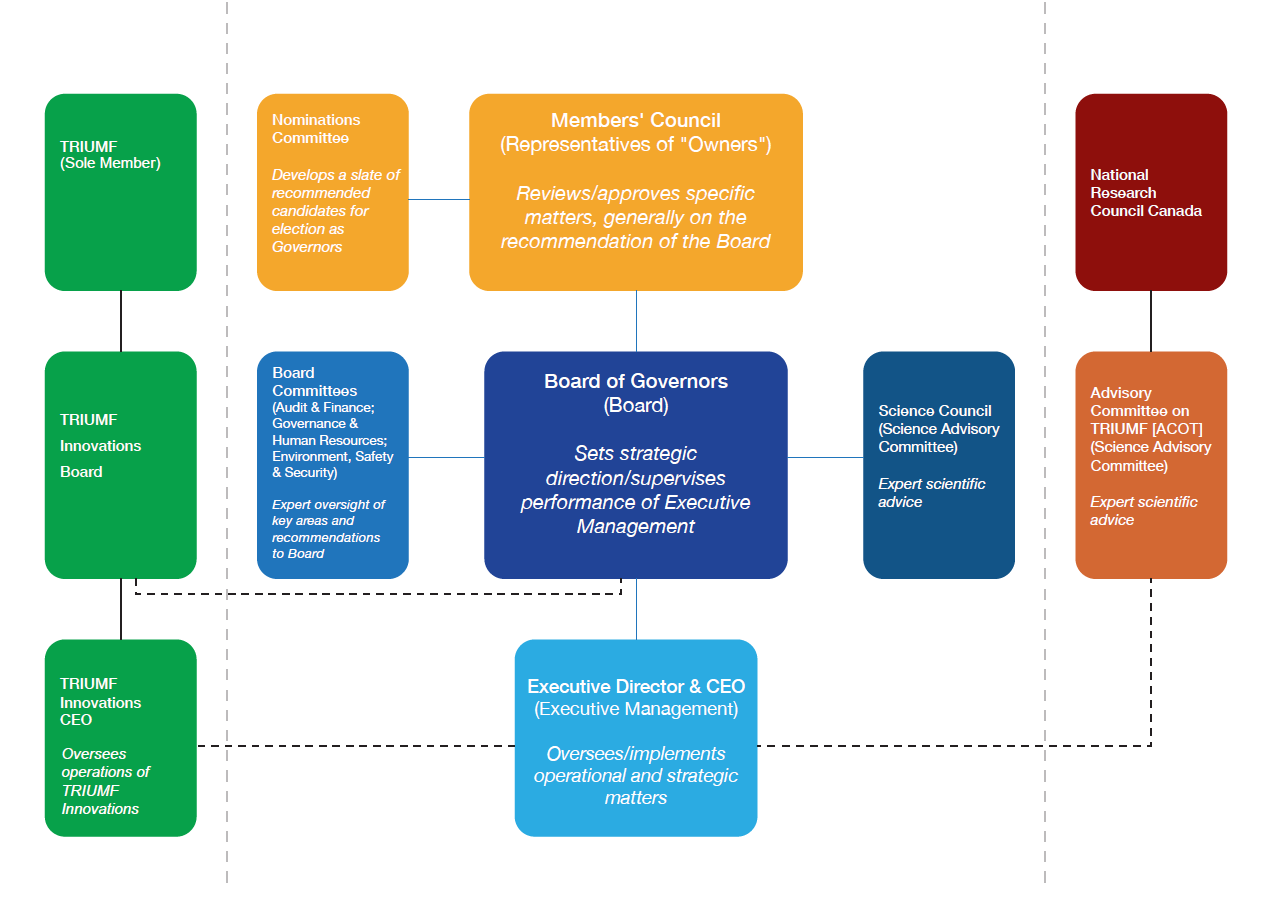
Governance
EXCELLENCE, INTEGRITY, ACCOUNTABILITY
TRIUMF INC. is owned by a consortium of 21 Canadian member universities, comprising a broad and comprehensive network of academic partners that spans Victoria to Halifax.
TRIUMF is a registered charity and a not-for-profit corporation incorporated under the laws of Canada.
TRIUMF BOARD OF GOVERNORS
The TRIUMF Board of Governors, which includes representation from all TRIUMF member universities, is responsible for managing or supervising the management of the activities and affairs of TRIUMF and is accountable to the Members’ Council.
The Board and Member’s Council review and approve budgets, reports, agreements, applications, and more.

GOVERNANCE STRUCTURE
The By-laws of TRIUMF INC. establish certain core elements of its governance framework. That framework includes:
- A Members’ Council – composed of one representative from each Member University;
- A Science Council – an advisory body composed of (a) one appointee from each Member University, (b) up to five (5) members of TRIUMF’s staff, and (c) up to five (5) individuals appointed by the Members’ Council from other institutions whose participation in TRIUMF has been approved by the Members’ Council;
- A Board of Governors
A full list of the Science Council, Members’ Council, and Board of Governors appointments are available here.

External Committees
TRIUMF is also overseen by several oversight commitees:
Advisory Committee on TRIUMF (ACOT)
The Advisory Committee on TRIUMF advises and engages TRIUMF via its Leadership Team and reports to the National Research Council Canada (NRC) on all aspects of the TRIUMF program insofar as they relate to the federal government’s contribution to the laboratory.
Member |
Role |
| Dr. S. Yennello (Sherry) Chair/présidente |
Professor, Cyclotron Institute Bright Chair in Nuclear Science, Texas A&M University |
| Dr. G. Aeppli (Gabriel) |
Head, Photon Science Division, Paul Scherrer Institute |
| Dr. P. Delahaye (Pierre) |
Physicist, Grand Accélérateur National d’Ions Lourds (GANIL) |
| Dr. J. Engle (Jonathan) |
Associate Professor, University of Wisconsin (UW) |
| Dr. H. En’yo (Hideto) |
Director, RIKEN Nishina Centre |
| Dr. L. Francesconi (Lynn) |
Professor, Hunter College, City University of New York |
| Dr. A. Gade (Alexandra) |
Professor of Physics, National Superconducting Cyclotron Laboratory, Michigan State University |
| Dr. S. Lapi (Suzanne) |
Professor, University of Alabama, Birmingham |
| Ms. K. McClure (Karen) |
Chief Investment Officer, Canada’s Digital Technology Supercluster |
| Dr. S. Seidel (Sally) |
Professor of Physics, University of New Mexico |
| Dr. M. Vretenar (Maurizio) |
Physicist, European Organization for Nuclear Research (CERN) |
| Dr. J. Lefebvre (Julie) |
Vice President, Emerging Technologies; National Research Council (NRC) |
|
Ms. I. Nikolova (Irina) |
Policy and Planning Analyst, Office of the Vice President Emerging Technologies, National Research Council (NRC) |
| Mr. A Livingstone (Angus) Ex-Officio/Membre d’office |
Representing TRIUMF Board of Govenors |
| Prof. C. Krauss (Carsten) Ex-Officio/Membre d’office |
Representing Institute of Particle Physics |
|
Prof. G. Huber (Garth) |
Representing Canadian Institute of Nuclear of Physics |
|
Dr. G. M. Luke (Graeme) |
On behalf of the Materials Science Community |
|
Mr. K. Lapointe (Kevin) |
Representing NSERC |
|
Dr. K. Pachal (Katherine) |
Representing the TRIUMF Users’ Executive Committee (TUEC) |
|
Ms. C. Fall (Claudia) Ex-Officio/Membre d’office |
Representing the Canada Foundation for Innovation |
Agency Committee on TRIUMF (ACT)
The role of the Agency Committee on TRIUMF (ACT) is to oversee the Government of Canada’s investment in TRIUMF and the economic benefits derived from that investment, with a with a focus on management, financial and commercialization matters. The Committee provides advice to elected officials and to the National Research Council on matters related to TRIUMF.
The Committee can meets on an as-needed basis, and other federal organizations with an interest in TRIUMF may be invited to participate as required.
Member |
Role |
| Mr. I. Stewart (Iain) Chair |
President – NRC & Chair, ACT |
| Mr. S. Kennedy (Simon) | Deputy Minister, Innovation, Science and Economic Development Canada |
|
Dr. A. Adem (Alejandro) |
President, National Science and Engineering Research Council (NSERC) |
Experimental Evaluation Committees
The Experimental Evaluation Committees (EECS)/Project Evaluation Committees review and approve new and ongoing experiments.
- Nuclear Physics EEC (NP-EEC)
- Life Sciences Project Evaluation Committee (LSPEC)
- Molecular and Materials Sciences EEC (MMS-EEC)
- Particle Physics EEC (PP-EEC)
UNIVERSITY MEMBERS
As one of the largest research facilities in the country, TRIUMF supports and drives the Canadian university-based research ecosystem. Our member universities, in turn, assist in overseeing the direction of TRIUMF’s science program, its management, and delivery of key strategic objectives.

